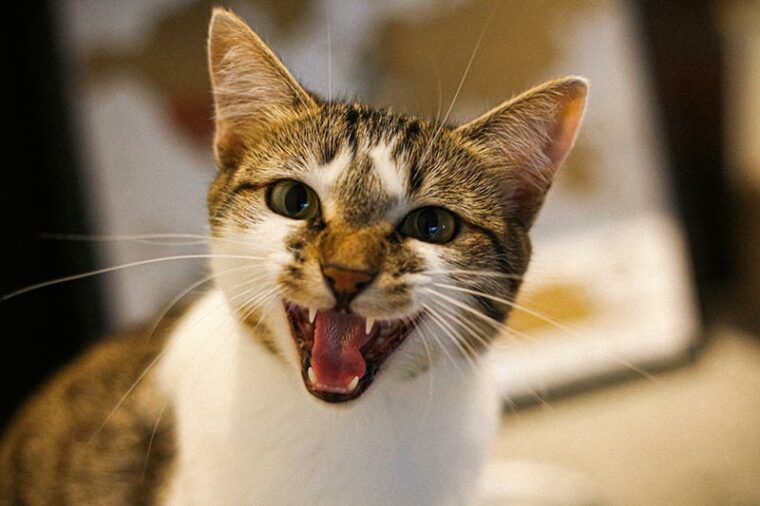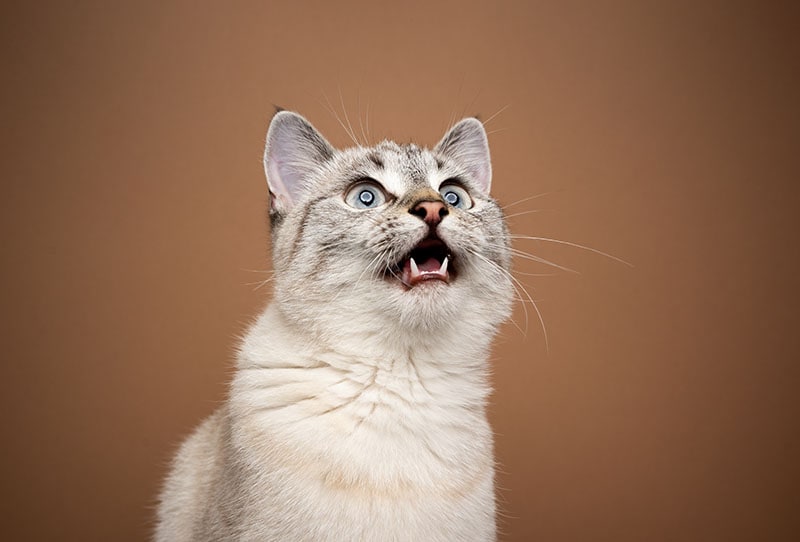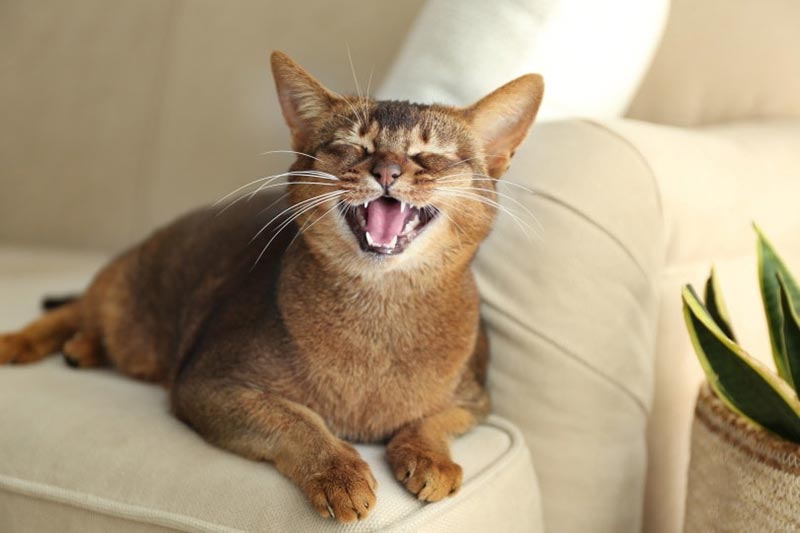
Click to Skip Ahead
If you own a cat, you’ve most likely been awakened by the persistent cries of your feline friend in the early hours. You may find yourself wondering about the reasons behind this behavior. Understanding the possible causes can help you address their needs in the morning.
Hunger and attention-seeking are the most common motivations. Other factors include changes in routine, environment, aging, or underlying health issues. In this article, we’ll delve into the various reasons why your cat may cry in the morning.
The 6 Reasons Your Cat Cries in the Morning
Cats can cry or vocalize in the morning for various reasons. Here are some possible explanations:
1. Hunger
Cats are creatures of habit. So, their internal clock often aligns with their feeding schedule. As natural hunters, cats have an instinctual drive to search for and consume food.
They may wake up with an empty stomach, prompting them to express their needs through crying. If your cat is on a strict feeding schedule, their morning cries may be a way to remind you that it’s time to feed them. This behavior is more likely if they didn’t receive their normal portion the night before.
To address this issue, ensure your cat’s feeding schedule is consistent. Give them a small snack before bedtime to help tide them over until morning. Plus, automatic timed feeders can deliver food at specific times when you’re asleep.

2. Seeking Attention
While cats may seem independent, they still need interaction with their human caregivers. When left alone for extended periods, they can experience loneliness and boredom. As a result, they may resort to vocalization to seek attention and engagement.
Cats express their desire for interaction and playtime by meowing in the morning. They may approach their owners, rub against their legs, or even jump on the bed. In these instances, their cries invite their owners to engage in stimulating activities.
To prevent this, dedicate time for play and interaction, especially in the morning. Getting their attention with pets and toys can prevent boredom and loneliness. They also need environmental enrichment, such as scratching posts, climbing trees, and puzzle toys.
3. Routine and Habit
Cats are highly attuned to routines and patterns in their daily lives. When they establish a morning routine of attention, playtime, or treats, they start to anticipate these interactions. If there is any delay in the routine, they may express their disappointment through meows.
Cats are skilled at understanding cause and effect. They associate certain actions or cues with specific outcomes. For example, if your cat receives treats every morning, they’ll expect it whenever you wake up.
When the expected outcome is withheld, they may vocalize their frustration. Consistency can help address such behavior. Establish and maintain a predictable routine to manage your cat’s expectations.
4. Environmental Changes
Cats are known for their sensitivity to changes in their surroundings. Any changes in their environment, big or small, can disrupt their sense of security. As creatures of habit, they thrive in a stable and predictable environment.
If there have been recent changes in the home, they express their discomfort by crying. For example, a new family member can introduce unfamiliar scents that unsettle a cat. Likewise, rearranged furniture can disrupt their established territories.
When cats face such changes, their morning cries can be a way of seeking reassurance. They may be communicating their need for comfort amidst the alterations around them.
To reduce morning crying, give your cat a consistent and safe space to retreat and feel secure. Ensure they can access familiar objects that hold their scents, such as their bed and toys. Provide treats and praise when introducing changes to help associate the changes with positivity.

5. Health Issues
Excessive crying in the morning can indicate an underlying health issue in cats. While occasional meowing is normal, persistent and abnormal crying should not be ignored.
Changes in appetite or unexplained weight loss can point to various medical conditions. Lethargy is another symptom that warrants attention. If your cat isn’t practicing their litter box habits, it could be due to urinary or gastrointestinal issues.
See veterinary care promptly if you notice these symptoms, along with morning crying. A vet will conduct a thorough examination to identify any underlying medical conditions. Early intervention can improve the prognosis and prevent further complications.
Remember that cats are masters at hiding signs of illness. So, their unusual vocalization can be their way of communicating distress. Trust your instincts as a pet owner, and don’t hesitate to contact a vet if you suspect something is amiss.
6. Aging or Cognitive Decline
As cats age, they may undergo changes that can affect their cognitive function. Older cats can develop feline dementia or cognitive dysfunction syndrome (CDS). This condition can lead to confusion, disorientation, and increased vocalization, including morning crying.
Cats with cognitive decline may find it challenging to recognize their owners or remember routines they were once familiar with. This confusion and disorientation can be distressing for them. It often leads to increased vocalization as they attempt to seek reassurance.
Morning crying in older cats may be due to confusion upon waking up. They may vocalize to communicate their needs or to seek a sense of security.
Reversing cognitive decline may not be possible at a certain age. But you can still use some strategies to help manage its symptoms. For example, a predictable routine is the simplest way to ease their anxiety. It may also help to provide a calm space with familiar scents and comfortable bedding. You must also consult your vet to assess your cat’s condition.
How to Prevent Your Cat From Crying in the Morning
If your cat is crying excessively in the morning, here are some steps you can take to address the issue.
Meet Their Basic Needs
To address your cat’s morning crying, it’s essential to meet their basic needs. Your cat must always have access to water, as dehydration can cause restlessness.
Additionally, maintaining a clean litter box is crucial. Discomfort or dissatisfaction with the litter box can lead to behavioral issues. Providing a balanced diet for nutritional requirements is also essential for their well-being.
To prevent excessive hunger in the morning, offer a satisfying meal before bedtime. This can help keep your cat satiated throughout the night and reduce the need to cry for food in the morning.

Stick to a Routine
Cats are creatures of habit. So, establishing a consistent routine can significantly impact their behavior, including morning crying. Set a regular schedule for feeding, playtime, and interaction with your cat.
Also, aim to feed them at the same times each day and dedicate specific periods for play and engagement. This routine provides a sense of predictability and security for your cat. As a result, it also reduces anxiety and potential morning restlessness.
Provide Enrichment and Stimulation
Boredom is a common trigger for excessive vocalization in cats. To prevent boredom, provide ample opportunities for mental and physical stimulation. Engage your cat using toys that mimic prey to tap into their natural hunting instincts.
Incorporate puzzle or treat-dispensing toys that encourage problem-solving and keep their minds occupied. Additionally, a cat tree can meet their need for vertical exploration and territory marking. These enriching activities can keep your cat mentally stimulated and reduce morning cries.
Tire Them Out Before Bedtime
Tiring your cat before bedtime can fix its sleep patterns and reduce morning restlessness. Cats are natural predators, so make sure to use toys that mimic prey. Once they fall asleep, you can expect them to stay asleep for at least 10-16 hours if undisturbed.
Set aside dedicated playtime in the evening with interactive toys and laser pointers. This encourages them to chase, pounce, and jump, providing an outlet for their energy.

Ignore the Crying
In most cases, cats simply cry because they seek your attention while you sleep. It’s crucial not to reinforce their attention-seeking behavior by giving in. If you respond to their cries immediately, they’ll learn it gets your attention.
Instead, be patient and ignore their crying for some time. Once they get quiet, you can attend to your cat’s needs. This teaches them that quiet behavior is more likely to result in the desired attention or care.
Rule Out Medical Issues
If your cat’s morning crying continues despite your attempts, seek professional advice from a vet. Better yet, take them to the vet first to rule this out. Persistent and excessive vocalization can sometimes point to an underlying medical issue.
A vet will perform a comprehensive exam to rule out health issues behind your cat’s behavior. They may also request blood work or imaging to better understand your cat’s condition.
Conclusion
Incessant crying from your cat in the morning can be concerning. You can determine why they’re crying by focusing on how often it happens. If your cat has a habit of crying every morning, it may be due to hunger or simply be them seeking some extra attention.
In other cases, underlying health issues and old age could be the culprit. If you’re concerned about such issues, discuss them with your vet to ensure your cat’s well-being.
Featured Image Credit: Marlon Soares, Unsplash






